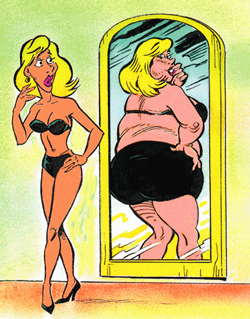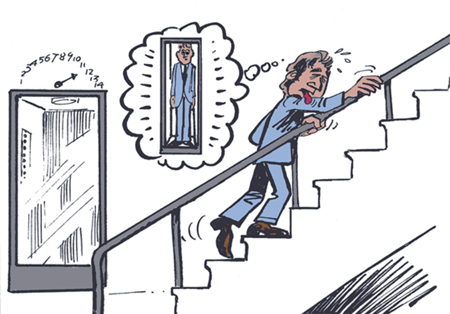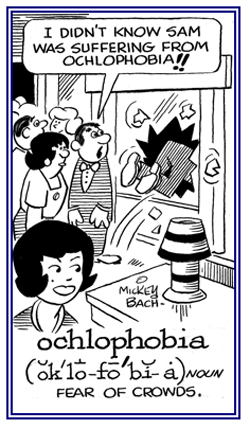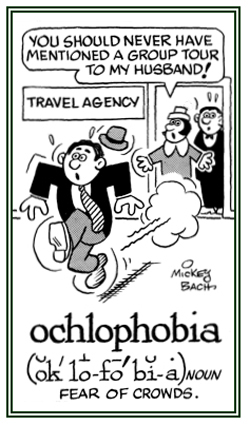phobo-, phob-, -phobia, -phobias, -phobe, -phobiac, -phobist, -phobic, -phobism, -phobous
(Greek: fear, extreme fear of; morbid, excessive, irrational fear, or terror of something or someone; however, sometimes this Greek element also means a strong dislike, dread, or hatred for something or someone)
For more details about the various phobias, visit this Phobias Introduction page to see Phobia Variations Defined and Explained.
There are only two forces that unite men: fear and self-interest.
Some dysmorphophic persons may be unable to look others in the eyes and try to hide that part of their physical structure of which they are most self-conscious by growing their hair or wearing a hat to conceal imagined baldness or oddly shaped ears, by wearing dark glasses to hide the shapes of their eyes, or avoiding swimming so others will not see their figures.
There are also other dysmorphophic individuals who will not even look in mirrors because their own reflections upset them considerably, and they want to wash zealously to make sure that they are very clean and smell acceptable to others, although they are already very clean.

Charles refused to drive a car because of his dystychiphobia and so he was always afraid that he might harm himself, a passenger, or a pedestrian in a collision.
People who have dystychiphobia (accident phobics) try to avoid risky jobs, atmospheric conditions, a tiring work schedule, and equipment failures.
Dystychiphobia is related to an abnormal fear of decision-making and a strong stressfulness resulting from their dread of making mistakes.
The difference between cowards and heroes is that cowards fear what they face, and heroes face what they fear.

Go to this Word A Day Revisited Index
so you can see more of Mickey Bach's cartoons.
Mirrors and other reflective surfaces have long been associated with the strange or the bizarre. For example, in Greek mythology, Narcissus fell in love with his own reflection in the water of a fountain. He thought he was seeing the image of a beautiful nymph. Unable to embrace or call forth the semblance, he pined away and was eventually transformed into a flower.
2. Etymology: eisoptrophobia is derived from the Greek eis, "into" and optikos, "vision, image, sight".Sometimes eisoptrophobia is mistakenly used to refer to termites, but such a reference is actually "isopterophobia".
Additional eisoptrophobia information
Known by a number of names: Eisoptrophobia, Fear of Mirrors, and Fear of Seeing Oneself in a Mirror are the most common terms. The problem often significantly impacts the quality of life. It can cause panic attacks and keep people apart from loved ones and business associates.
Symptoms of eisoptrophobia typically include shortness of breath, rapid breathing, irregular heartbeat, sweating, nausea, and overall feelings of dread; however, everyone experiences eisoptrophobia in his or her own way and may suffer with different symptoms.

Doug, a shy boy, suffered from enochlophobia and offered his friends excuses for not going to the outdoor rock concert by saying that he was afraid of getting lost, getting a disease from someone in the mass of people, or maybe even being trampled!




